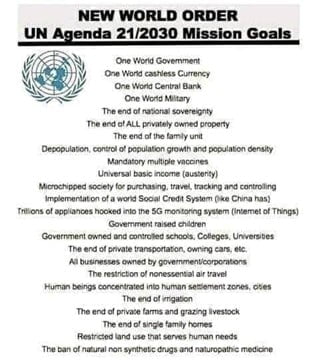There is nothing exciting or sexy about a non-binding multinational attempt to develop a sustainable approach to meeting human development goals “while simultaneously sustaining the ability of natural systems to provide the natural resources and ecosystem services on which the economy and society depend.”
If only there was a kernel of excitement – perhaps we might have all badgered our political representatives into enacting the United Nations’ Agenda 21 (and Agenda 2030, more properly called The 2030 Agenda for Sustainable Development) frameworks, and be making faster progress towards a healthier, more equitable, more sustainable civilisation.
A few groups do get excited by Agenda 21 and Agenda 2030, however: policy wonks, environmental and social scientists, and – these being UN documents – conspiracy theorists. Posts such as this one which have been shared hundreds of times across dozens of groups on Facebook, claiming that the UN Agenda 21 and Agenda 2030 has the following goals in mind:

These ideas have reached millions across the world and occasionally find their way into semi-respectable fringe journals (and even major political parties), often with the exhortation that the reader do their own research, as it is available for anyone to see, published right there on the UN website.
So I decided I would indeed do my own “research”, and read the actual documents. Here’s what I found with respect to each of those viral claims:
“One World Government / The end of national sovereignty”
Both documents in fact repeatedly point to the opposite, with Agenda 21 referring to making changes “at the national and local levels” (35.15) which rather implies the continued existence of the independent nation state. Agenda 2030 suggests that one way to combat inequalities between nations is to “implement the principle of special and differential treatment for developing countries” (10a), which again seems to suggest the continued existence of separate, different nations, backing up their later statement that recognises “that each country has primary responsibility for its own economic and social development” (41).
“One World cashiers Currency / “One World Central Bank”
Currency is not mentioned in either document. There are references to banking – for example, development banks, reduction of commercial bank debt, and making banking and finance accessible to all (a good thing!), but there’s simply no evidence of a one world currency in either document. Obviously there has been a World Bank since the 1940s, and it certainly has its share of reasonable criticism, but it would be a gross mischaracterisation to claim this was a one world central bank, in the sense of “an institution that manages the currency and monetary policy of a state or formal monetary union.”
“One World Military”
The military is barely mentioned in either document, only appearing a couple of times in Agenda 21 with a suggestion that governments should ensure “military establishments conform to their
nationally applicable environmental norms in the treatment and disposal of hazardous wastes” (20.22.h). Governments, plural!
There’s also a suggestion (33.16.e) that one of many ways that governments might fund all this saving humanity business is by spending less on their armed forces. Agenda 2030 does propose that we should “significantly reduce all forms of violence and related death rates everywhere” (16.1), which I guess could be very oblique code for a One World Military, but this seems unlikely in the wider context of that goal, which repeatedly refers to individual nation states’ responsibilities.
“The end of ALL privately owned property”
Nope. Again, quite the reverse: as in paragraph 41, Agenda 2030 specifically acknowledges “the role of the diverse private sector, ranging from micro-enterprises to cooperatives to multinationals”. Given that the plans both comprehensively subscribe to the free-market capitalist consensus it is frankly ridiculous that Agenda 21 conspiracy theorists for some reason seem to think it is some sort of communist plot. In section 24, Agenda 2030 also specifically endorses private property, saying we should devote resources to “supporting smallholder farmers, especially women farmers.”
“The end of the family unit / Depopulation, control of population growth and population density”
There’s nothing in either to suggest that the UN is planning for the end of the family unit. Both documents are enthusiastic about family planning and controlling population growth, but surely only the most ardent Catholic or quiverfull evangelical Christian would think that having a limited number of children in a world of limited resources is anything other than sensible. Perhaps the detractors think we can fit an infinite number of people on the planet.
Similarly, there’s nothing on depopulation. Agenda 21 does reference the challenges of demographic growth and density, for example in terms of providing good sanitation to low income, high population density areas (18.61). It is also pretty keen on sustainable land use, which could indeed relate to nations trying to control population density in certain areas, eg: “developing strategies and programmes to mitigate the adverse impact of environmental change on human populations, and vice versa.” (5.6.c). Note, however, that the priority is sustainability for humans, and protecting humans, as it is throughout both documents. Protecting the environment just gets a “vice versa”, and perhaps with good reason. Life on Earth as a whole will likely survive our unsustainable ways, but humanity itself may not.
“Mandatory multiple vaccines”
Agenda 21 repeatedly refers to making vaccines widely available (16.13.e), but not mandatory. Agenda 2030 suggests that universal health coverage (3.8) would be a good way to achieve this, and other health benefits. A lot of countries already manage this in one way or another!
“Universal basic income (austerity)”

I’m unsure why “austerity” is attached to UBI, but Agenda 21 does suggest universal… healthcare, education and access to water. Not a universal basic income. Agenda 2030 does suggest that we should aim to “Implement nationally appropriate social protection systems and measures for all” (1.3), but this surely refers to traditional welfare protections, not UBI.
“Microchipped society for purchasing, travel, tracking and controlling”
Not in either document.
“Implementation of a world Social Credit System (like China has)”
Discussion of credit? Sure! A world social credit system? No.
“Millions of appliances hooked into the 5G monitoring system (Internet of Things)
No 5G mentioned anywhere in either document, nor anything on the internet of things. The writer of this list was, I have to assume, getting a bit desperate by this point.
“Government raised children”
There’s no suggestion in either document that the government should replace parents.
“Government owned and controlled schools, Colleges, Universities”
Although both documents contain many references to governments providing education for all, state-funded schools already “exist in virtually every country of the world,” so while this one is technically correct, I’m not sure why it is on a list of an apparently sinister plan to create a new world order.
“The end of private transportation, owning cars, etc.”
Agenda 21 does “encourage non – motorized modes of transport” (7.52.c) – but rather than enforcing this by banning the private ownership of cars it suggests that governments and the international community work out how much such schemes would cost, pay for them to be implemented, and then “raise public awareness of the environmental impacts of transport and travel behaviour through mass media campaigns and support for non-governmental and community initiatives promoting the use of non-motorized transport, shared driving and improved traffic safety measures” (7.54.b). Agenda 2030 says much the same in Goal 11, but neither document proposes phasing out car ownership.
“All businesses owned by government/corporations”
I was going to point out that both documents mention private ownership throughout, but then this is another puzzling statement. Generally speaking, most businesses (by income and value, if not by total number of businesses) are already what are known in the USA as corporations. In any case, neither document proposes doing away with private businesses, family businesses, sole traders, or any such things. In fact, Agenda 21 specifically highlights the ownership and stewardship of land through family farms and at a village level rather than central government or large corporation in section 32, and Agenda 2030 does the same regarding smallholder farmers in section 24.
“The restriction of nonessential air travel”
Not mentioned in either document.
“Human beings concentrated into human settlement zones, cities”
This is not a stated aim of either document. While there are calls for the sustainable use of rural and coastal and marginal areas, Agenda 21 speaks of supporting such communities throughout the document, and specifically says: “The overall human settlement objective is to improve the social, economic and environmental quality of human settlements and the living and working environments of all people, in particular the urban and rural poor” (7.4, emphasis mine). Agenda 2030 also specifically speaks of “developing rural areas and sustainable agriculture and fisheries” (section 24).
“The end of irrigation”

Agenda 21 does have a lot to say about the potential issues with irrigation, e.g. “new irrigation schemes should be accompanied by an environmental impact assessment, depending upon the scale of the scheme, in case significant negative environmental impacts are expected,” (18.72) but does not call for it to end. In fact, later in the document it encourages states to “develop small-scale irrigation and water-supply for humans and livestock and for water and soil conservation” (18.76.e.i) and “formulate large -scale and long-term irrigation development programmes, taking into account their effects on the local level, the economy and the environment” (18.76.e.ii).
“The end of private farms and grazing livestock”
As already mentioned, this is specifically contradicted in Agenda 21, Chapter 32.
“The end of single homes”
Agenda 21 talks a lot about households, but nowhere about ending single-household homes.
“Restricted land use that serves human needs”
While some would say this might be a good idea, where these documents mention land use of fragile ecosystems, it is in terms of people using them sustainably, rather than not using them at all, for example Agenda 21 (32.4): “successful implementation of these programmes lies in the motivation and attitudes of individual farmers and government policies that would provide incentives to farmers to manage their natural resources efficiently and in a sustainable way.”
The closest thing I could find to the conspiracist claim is in section 7.18 on city development in developing countries: “sound urban management is essential to ensure that urban sprawl does not expand resource degradation over an ever wider land area and increase pressures to convert open space and agricultural/buffer lands for development.” This is, albeit with varying degrees of success, already what happens in many countries around the world.
“The ban of natural non synthetic drugs and naturopathic medicine”
Agenda 2030 does strive for “access to safe, effective, quality and affordable essential Medicines and vaccines for all” in Goal 3.8, but does not mention naturopathic medicine or synthetic vs non-synthetic drugs. Perhaps detractors are worried about 16.13.c in Agenda 21: “Establish and enforce screening, systematic sampling and evaluation procedures for drugs and medical technologies.” Of course, if naturopathic medicine is systematically shown to be effective, they have nothing to worry about here! Realistically, though, we live in a world where half the population live in countries with governments that specifically promote pseudoscientific naturopathic medicines, and that doesn’t look to be changing any time soon. Either way, this objective does not specifically ban “natural” medicines, just calls for an end to ineffective or unsafe medicines.
The unspectacular truth
To conclude, it will come as little surprise to readers that Agenda 21 and Agenda 2030 make for the kind of dry reading that one would only do for work, if one were an environmental or social scientist, or if one happened to be writing an article for The Skeptic.
My assumption has to be that not a single believer in this conspiracy theory has read either document in full, because these two papers contain none of the goals that the conspiracy theorists claim, aside from those, like free education, that already exist.
These conspiracies have been around for years, but seem to have been given a big boost by the Covid-19 pandemic, which conspiracy adherents believe is part of the population control aspect of the plan. Why one would devise a pandemic which would kill millions rather than billions if one were planning a 95% reduction in world population isn’t clear, but then nothing about this confusingly popular conspiracy theory makes sense.
The enforcement aspect is particularly baffling: even if this were the United Nations’ secret plan, how is the UN going to make all this happen? While it has had significant successes in ending some wars, the UN has notably failed to stop various genocides and conflicts; it is far from all-powerful. I believe that the existence of the UN is a net positive, but even its most ardent supporter would have to acknowledge that it lacks the bite to really make anything happen without the enthusiastic participation of nation states.
There’s nothing to see here, except a sensible set of goals that if enacted might give humanity a fighting chance at a future. Even the Daily Mail has started showing signs of coming around to sustainability of late!



